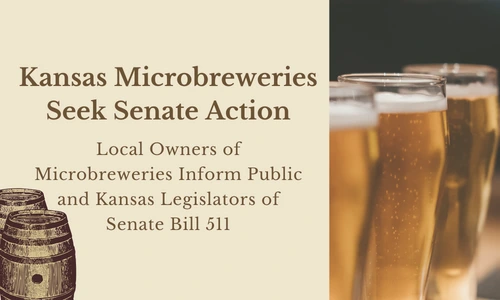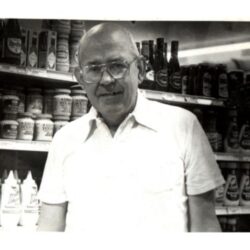
By Brenna Eller
HUTCHINSON, Kan. — Although they may be competitors, microbrewery owners across Kansas, and especially in local communities are coming together in support of Senate Bill No. 511, which has been brought to the Kansas Senate after microbrewers have noticed a similarity in feeling their products aren’t being as well represented as they could be.
Microbreweries in Kansas currently do not have the ability to sell beer directly to consumers, and instead have to go through a third-party distribution process.
According to the Kansas Legislature, SB511 was introduced to the Senate on Feb. 13, and referred to the Committee on Federal and State Affairs on Feb. 14.
The short title of SB 511 Reads: “Permitting beer and hard cider sales by microbreweries to retailers, public venues, clubs, drinking establishments, holders of temporary permits and caterers and allowing such sales at special events to consumers.”
Besides wanting the freedom to sell directly to consumers, microbrewery owners seek to modernize the law, established in 1949, which was at the time that Kansas repealed prohibition.
“It’s overrated,” said Steven Petermann, founder of Salt City Brewing Company in Hutchinson. “When prohibition was repealed, the three-tier system was established, microbreweries didn’t even exist. Craft beer wasn’t even a concept back then.”
Under the current Kansas Beer Law, if they want to sell their product outside of their taprooms, microbreweries are required to sell their product to a third-party distributor, and that third party then has the option (not requirement) to offer the product to retailers (i.e. bars, restaurants and liquor stores). According to Petermann, the law also restricts microbreweries to only one 3rd party per territory, which means there is No Free Market Competition to what retailers can access.
“Kansas is a strong franchise law state. Once you’ve appointed a franchisee, it’s hard to make a change regardless of their performance,” Petermann said.
He explained that even if a distributor begins a relationship with a brewery, calling it the “honeymoon phase” and does a good job for the brewery, at some point if something happens where they want to promote somebody else or have less incentive to promote the brewery’s beer, there are no alternatives at this point.
“We can try to remove a distributor; we can ask them,” Petermann said. “If they refuse though, it takes litigation, we have to prove reasonable cause and even if that sounds simple to do that takes years or more, it seems in my experience.”
Pippin and Jonathan Williamson, Co-Founders of Sandhills Brewing are two of many microbrewery owners across the state also watching the status of SB511 closely, as it significantly impacts their business.
“The business across the street from us is a little axe throwing business. They sell cans of low strength beer to their customers, and they would like to stock ours. Well, we would happily send it to them,” said Pippin Williamson, who runs Sandhills Brewing in Hutchinson. “In order for us to get our beer to them we have to first sell to our distributor who’s on the far other side of town, then that distributor has to sell to a wholesale liquor store over on 30th and Plum, and then that wholesale liquor store can sell it to them. So, beer literally has to touch every corner of the city of Hutchinson before we can take it 50 feet across the street.”
Williamson explained that he first sells to the distributor. The distributor then sells to the liquor store, and then the liquor store sells to the business.
“You have four different players involved with that one transaction when, let’s be honest, it should be a single transaction,” Williamson said. “That’s what it should be and that’s what this would allow if this passes.
The first goal for the movement in terms of the legislative process is to get a hearing according to Petermann and to have them vote on the bill.
“If we get to that point, I think it’s a no brainer. I think it’s free enterprise,” Petermann said. “It’s letting microbrewers be entrepreneurs; letting us control our own destiny. We’ll succeed or fail on our own merits, not on whether or not we’re popular with a distributor or whether their goals align with ours.”
Petermann shared that for decades the farm wine industry in Kansas has been able to do direct sales.
“You’re talking about 75-year-old laws that prohibit us from doing it,” Petermann said. “I believe it was 1989; farm wineries were allowed to do direct sales and they still are. All we’re asking for is parity with them. It’s a system that’s already been established for 35 years and to my knowledge they continue to allow them to do it.”
Petermann and Williamson wanted to be clear that SB511 does NOT remove any rights from distributors.
“It does remove what we would believe to be a legislative monopoly because only one distributor can distribute in a specific territory,” Petermann said. “We can’t have competing distributors, so if one doesn’t do a good job, another one can. Right now, we can’t, so there’s no ultimate motivation. I mean, just let us be businesspeople. Regardless of our business acumen, the quality of our product, if we can’t get the product out in the hands of consumers, it doesn’t matter.”
Salt City Brewing and Sandhills Brewing both work with three distributors. The distributors they use are out of Hutchinson, Wichita and Kansas City, mostly staying in the Eastern half of Kansas.
“Truly, we will continue to work with them after, if this passes,” Pippin Williamson said. “At the end of day, we’re not interested in replacing what they do. We’re not interested in running the delivery route or delivery trucks. We just want the freedom to be able to sell directly through our local neighborhood.”
But if a brewery wanted to run their own distribution, have their own delivery trucks or their own delivery crew, Williamson believes they should have the freedom to do so.
“That’s not our personal interest, but I think that they should have that right,” Williamson said.
Some arguments Petermann has heard against the bill have to do with ensuring the quality of the products.
“No one cares more about our product than we do. And I think that’s true of all microbreweries across the state,” Petermann said. “It’s a representation of us. I’m confident it would be good for consumers to have competition. It’s good for markets. If we’re able to compete for shelf space and tap handles, that’s going to lead to better selections and values for the consumer.”
If the bill were to pass, Williamson argued that another positive outcome would be “consumer’s choice,” allowing people to have the option to purchase the big-name brand or if they would rather buy a local brand, they could do that.
Petermann and Williamson have received a lot of local support on the matter, and they are hoping to spread more awareness on the subject.
“I think that the public was unaware that this was how the system worked,” Petermann said.
Williamson believes increased public awareness is nothing but positive for business in the brewery industry. Especially when there are about 80 breweries in the state of Kansas and the vast majority are in small communities.
“The more people read about it, show interest in it, show an interest in changing the laws, the more likely we are to get action to happen,” Williamson said.
Besides getting the word out about the bill, the next step for Williamson is to let the legislators and lobbyists in Topeka do their negotiating back and forth, let them find compromises where needed and then hope that the bill goes up for a vote.
“If it doesn’t succeed, we’ll keep trying,” Williamson said. “This is something that 41 other states have already legalized, either legalized in some way or have always had since brewery laws were put into place. We’re one of the very few states that don’t have this.”
Petermann believes the legislators will call a hearing.
“I’m an eternal optimist,” Petermann said.
He expects once that happens, breweries from across the state will start to give their testimonies.
“I hear there’s lots of good discussion and things going up on ‘The Hill’,” Petermann added. “I will be making a trip down there by the end of this month and we’ll be sitting down with representatives and senators to visit more about the topic.”
Sean Willcott, founder of Willcott Brewing Company & Taproom in Holton, Kan., was who spearheaded the initiative according to Petermann and Williamson.
“He [Willcott] was having similar struggles to what I’ve experienced in feeling that his product was not very represented in the market,” Petermann shared. “And because of that, he started calling around to breweries across the state and discovered they’re having similar issues and that’s what I think led to this.”
Williamson mentioned that Willcott’s serious efforts with the process began about three months ago, and the initial bills were drafted a few weeks ago.
The official bill was introduced to the Kansas Senate on Feb. 14, 2024, by Scott Schneider on behalf of Kansas Craft Brewers Guild Inc.
“The Kansas Craft Brewer’s Guild is basically a membership group of breweries from around the state of Kansas that basically get together to try to focus on raising awareness for local breweries, improving, working in Topeka to improve laws that impact local breweries,” Williamson said. “Basically, it’s a membership group to represent the interest of breweries.”
For now, Petermann and Williamson said whether you have a brewery, like your brewery, or care about them in your community, you can help by calling your local legislators, Kansas Senators and House Representatives.
“Getting more pressure on our legislators to say, ‘Hey, we should support this thing,’ then they’re more likely to push for it to get voted on and hopefully pass on the law,” Williamson said.






















